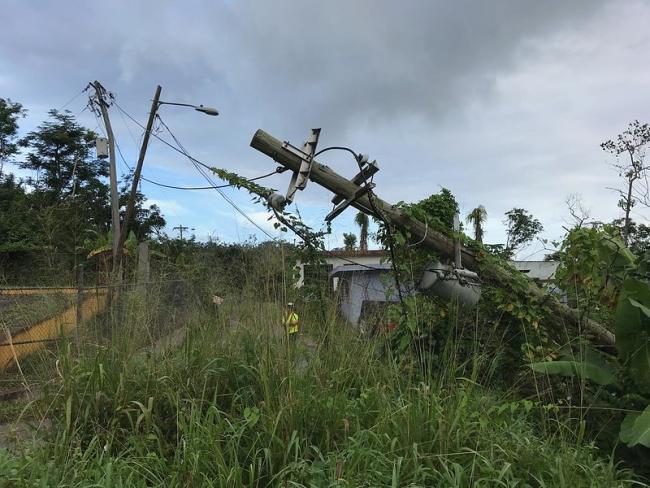
In March 1974, thousands gathered in the Plaza Las Delicias in Ponce, Puerto Rico. Organized by the Puerto Rican Independence Party (PIP), the event was to commemorate the abolition of slavery and the 1937 Ponce massacre, when 19 people were killed as police opened fire on independence activists protesting the United States’ incarceration of the Nationalist Party leader, Pedro Albizu Campos. The gathering also served another purpose: to demand the expropriation of the Commonwealth Oil Refining Company (CORCO), the archipelago’s largest refinery at the time.
Addressing people in the plaza, PIP president Rubén Berríos Martínez spoke of “the new slavery” rooted in colonialism and capitalism. “In its political form,” Martínez said, “enslavement is [the process] by which decisions are made in the United States, even though they adversely affect us here in Puerto Rico, as is the case now with oil.” Víctor Guillermo Fernández, then president of the Electrical Industry and Irrigation Workers Union (UTIER), emphasized the government’s lack of power to halt CORCO’s continuous oil price increases, which caused “inflated electricity bills.” Connecting the energy crisis to Puerto Rico’s colonial status, Fernández called for the need to “unmask” the local government. “The rich are the ones that support the parties in power and that is why the parties are committed to the rich and not the working class.”
Fifty years later, Martínez and Fernández’s observations regarding the connection between energy governance and the role of U.S. imperialism and Puerto Rican elites in preserving and exploiting Puerto Rico’s lack of sovereignty continue to resonate. Environmental struggles against fossil fuel energy and foreign privatization remain entangled with the political struggle over self-determination and the legacies of racial slavery. Today, these debates have taken center stage in Puerto Rico’s 2024 gubernatorial election.
Energy and political status are urgent issues for a Puerto Rico facing the compounding calamities of neoliberal austerity, climate catastrophes, and energy crisis. In the gubernatorial race, one emergent political force appears to offer an alternative to the status quo. La Alianza, a new left-wing electoral coalition between the PIP and the Citizens’ Victory Movement (MVC), has fractured the duopoly held for over half a century by the pro-commonwealth Popular Democratic Party (PPD) and the pro-statehood New Progressive Party (PNP). The pro-decolonization alliance thus poses a threat to U.S. imperialism and political elites’ colonial stronghold over the archipelago.
According to a recent poll by El Vocero, La Alianza candidate Juan Dalmau is in second place with 29 percent of the vote, while the PNP candidate Jenniffer González-Colón is leading with 31 percent and PPD candidate Jesús Manuel Ortíz is in third with 18 percent. Dalmau presents the only comprehensive plan for building a just and sustainable public energy future.
Political Disenchantment and Energy Crises in the Aftermath of Disaster

In the wake of Hurricanes Irma and María in September 2017, Puerto Rico’s archaic energy infrastructure was left totally devastated. Although UTIER workers toiled around the clock to restore power and local communities pioneered their own solar energy initiatives, the blackout persisted for 11 months. It was one of the longest and deadliest blackouts in U.S. history.
The post-hurricane catastrophe catalyzed discussions about the critical need for more resilient and renewable energy infrastructure. Yet, since then, privatization has deepened the archipelago’s dependence on fossil fuel energy. In 2018, former PNP governor Ricardo Rosselló announced plans to privatize the state-owned Puerto Rico Electric Power Authority (PREPA). After backdoor dealings with PPD and PNP officials, Puerto Rico handed control over the power transmission and distribution to the U.S.-Canadian LUMA Energy in June 2021. Two years later, in July 2023, Genera PR, a subsidiary of the New York-based New Fortress Energy, was contracted to manage, maintain, and decommission PREPA.
Any promise that privatization would supply cheaper and more reliable services was never realized. Even as 43 percent of Puerto Rico’s population lives below the poverty line, residents and small businesses pay nearly twice as much for electricity as the U.S. mainland population and continue to experience chronic outages.
The cascading consequences of neoliberal abandonment and austerity—including a failing healthcare system, public school closures, and gentrification and displacement—in the aftermath of the hurricanes have sparked widespread discontent with the PNP and PPD’s failed economic and political promises built on commonwealth status and fleeting aspirations for statehood. This heightened disenchantment, as Yarimar Bonilla describes, has mobilized efforts to upend and reimagine a future outside the ceaseless crisis of colonial capitalism and postcolonial sovereignty. Now, aspirations to overturn the PPD/PNP duopoly and their longstanding efforts to liquidate the archipelago’s human and environmental resources permeate the upcoming election.
Fossilizing a Disastrous Energy Non-Future
As junior partners to the U.S. empire and in allegiance with foreign capitalists, PNP and PPD elites have relied on energy as a crucial site to consolidate political and economic power. The PNP’s González-Colón and PPD’s Ortíz are harnessing the energy crisis to secure votes. At the PNP General Assembly in September, González-Colón joined Dalmau and Ortíz’s calls to dissolve the contracts with LUMA Energy—a shift from her proposal to appoint a “czar” to oversee the corporation a month prior. Yet both González-Colón’s and Ortiz’s plan to resolve the energy crisis is simply to replace LUMA with another private operator.
Throughout her term as resident commissioner—Puerto Rico’s non-voting representative in the U.S. House of Representatives—González-Colón has been a staunch supporter of using methane gas to fuel the archipelago’s electricity. In 2018, she proudly stood beside Republican representative Rob Bishop, then chairman of the House Natural Resources Committee, as he relayed his plan to expand methane gas to transform Puerto Rico into “the energy hub of the entire Caribbean area.” This began to come to fruition when the U.S. supply chain company Crowley inaugurated a methane gas loading terminal in Peñuelas, Puerto Rico, in May 2022. González-Colón stated the terminal would boost the use of so-called transition fuels, such as methane gas. According to a 2021 report by the United Nations Environment Programme and Climate and Clean Air Coalition, however, over a 20-year period, methane gas is “80 times more potent at [global] warming than carbon dioxide.”
González-Colón’s bid, in league with LUMA and Genera PR, to expand the use of methane gas undermines the 2019 Puerto Rico Energy Public Policy Act, which mandated Puerto Rico receive 40 percent of its electricity from renewable energy sources by 2025 and 100 percent by 2050. In short, methane gas expansion threatens Puerto Rico’s renewable energy future. González-Colón’s campaign donors include Puerto Rico’s largest architecture firm Álvarez-Díaz & Villalón, contractors of the luxury tourist development Esencia in Cabo Rojo. This megaproject has received $497 million in tax exemptions from the Puerto Rico Tourism Company, including 100 percent in tax exemption on fossil fuels. Such financial incentives encourage these entities’ use of oil and hydrocarbon fuels like methane gas.
Despite a 2020 U.S. Department of Energy study concluding that Puerto Rico could hypothetically meet 100 percent of its energy needs through rooftop solar panels, González-Colón has urged the U.S. secretary of energy to stop promoting solar initiatives. Ortíz proposes to support large-scale renewable energy projects and locally based micro-grid renewable energy cooperatives. However, his commitment to private utility corporations guarantees a profit-driven energy system heavily reliant on fossil fuels. Private large-scale solar farms in the southern coast of the main island have already proven to be detrimental, destroying arable farm land and flooding local communities.
González-Colón’s and Ortíz’s energy proposals would enable local and foreign elites to continue to financially exploit Puerto Rico’s lack of sovereignty. Local elites have historically benefited from the colonial economy through speculative finance and real estate development. Through the privatization of public assets, like PREPA, and tax-incentive programs to attract foreign investment, these elites continue to secure and accumulate their wealth. González-Colón and Ortíz’s platforms may appear to acquiesce to demands to end the contract with LUMA and create a clean energy future. However, both intend to double down on the foreign privatization of energy in ways that will escalate environmental harm and intensify the prevalence and magnitude of climate disasters.
Generating a Sustainable Public Energy Future
La Alianza’s candidate, Dalmau, offers the most comprehensive vision to restore public control over Puerto Rico’s energy, promote a reliable and renewable energy transition, and address the political corruption and debt accumulation that helped facilitate the current energy crisis. The core feature of his proposal is the adoption of the self-sufficient and sustainable solar energy development plan laid out by Queremos Sol, a multi-sector coalition of scientific, labor, and environmental organizations working toward enhancing rooftop solar energy and an accelerated withdrawal of fossil fuels-based generation.
Dalmau’s plan begins with the immediate cancellation of the contracts with LUMA and Genera PR and a transition toward a reformed public energy system. To avoid corruption and political proselytism, PREPA would be refashioned into an independent entity—with a Board of Directors composed of scientific and economic experts, representatives of environmental and small business organizations, labor unions, and consumers—so energy governance reflects residents’ needs. Although the PIP is committed to the promoting independence, La Alianza supports the establishment of a National Assembly of Status to formulate, then negotiate with U.S. Congress, the transition processes for independence, statehood, and free association. This is followed by an extensive educational campaign on the options and a binding referendum, where Puerto Ricans will decide on the archipelago’s political future.
Threatened by the rapidly growing support for Dalmau and independence among younger voters, the PPD and PNP have engaged in voter disenfranchisement tactics. In September—despite the State Elections Commission’s defective online registration system, limited in-person registration options, severe backlogs, and frequent power outages—members of the PPD and PNP voted against La Alianza’s request to extend the voter registration deadline. The U.S. District Court for the District of Puerto Rico then denied a legal request for an extended deadline, filed by the American Civil Liberties Union (ACLU). The same week voter registration came to a close, the Center for Investigative Journalism uncovered a two-decades-long vote-stealing scheme undertaken by the PPD and PNP.
Fifty years have passed since the PIP’s gathering in Plaza Las Delicias, but the struggles over energy sovereignty and self-determination remain intertwined. In this unprecedented 2024 gubernatorial election, La Alianza offers an opportunity to upend elites’ political stronghold and usher in a just, dependable, and sustainable public energy future.
Jaden A. Morales is a Ph.D. Candidate in the Department of American Studies & Ethnicity at the University of Southern California. Their current research is a visual and environmental history of energy, racial capitalism, and non-sovereign statecraft in Puerto Rico and the diaspora.

